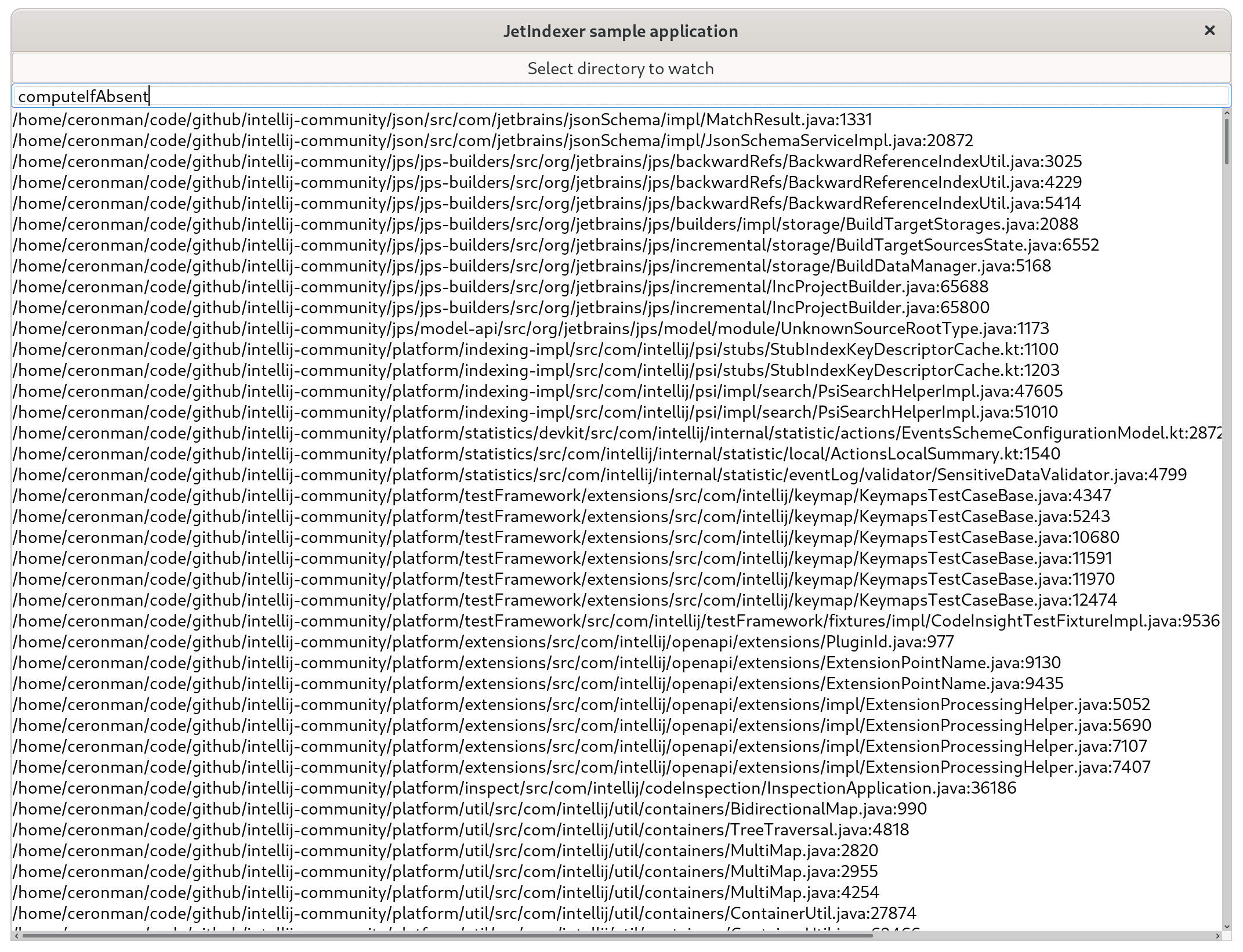A text search engine library for Kotlin.
JetIndexer takes a list of directories and it indexes text files contained in those recursively. Additionally, it can watch those directories for changes and update the index accordingly. Once the index is built it is possible to search text in the indexed files in a fast way.
The indexation process can be customized by providing a custom Tokenizer and/or
QueryResolver. Filtering which files should be indexed can be configured by
providing a IndexingFilter object.
First, create JetIndexer object with the list of paths of the directories that you
want to index. You should also pass a Tokenzier, a QueryResolver and a IndexingFilter:
val path = Paths.get("path/to/dir")
val indexer = JetIndexer(
listOf(path),
TrigramTokenizer(),
TrigramSubstringQueryResolver(),
DefaultIndexingFilter(),
)
indexer.index()In this example a TrigramTokenizer will be used, which will split the text in trigrams.
For example, if a file contains the word kotlin, this would be tokenized as
("kot", "otl", "tli", "lin"). This allows for searching substrings in the index using the
corresponding TrigramSubstringQueryResolver.
The DefaultIndexingFilter will index only files that look like text and it will skip binary formats.
Optionally, you can start a file watcher that will observer the filesystem and react to files
added or updated and add them to the index. This can be done using the indexer.watch() method.
This method blocks, so it's recommended to call it from a coroutine:
launch {
indexer.watch()
}To search the index, just use the indexer.query() method:
val results = indexer.query("foo")
for (result in results) {
println("${result.term} -> ${result.path}:${result.position}")
}To stop the file watching just call:
indexer.stopWatching()To provide a custom tokenizer, just implement the Tokenizer interface:
interface Tokenizer {
fun tokenize(path: Path): Sequence<Token>
}To provide custom search capabilites, implement the QueryResolver interface:
interface QueryResolver {
fun search(index: InvertedIndex, query: String): List<QueryResult>
}To provide a custom filter to decide which files to index and which not, implement the IndexingFilter
interface:
interface IndexingFilter {
fun shouldIndexFile(path: Path): Boolean
fun shouldIndexDir(path: Path): Boolean
}The project uses Maven for building and dependency management. To build just run
mvn clean package
To run the tests:
mvn test
There is a simple example program using Java Swing that demostrate how the library is used.
To run it just run:
mvn clean package
java -jar sampleapp/target/sampleapp-1.0-SNAPSHOT-jar-with-dependencies.jar
JetIndexer uses an inverted index to store a table mapping
tokens to posting lists. A posting list is a list of files and the corresponding integer positions where
the token appears in that file. The inverted index starts as an in-memory HashMap and after reaching certain
size it's written to disk in a shard. A shard then stores a map of token to offsets in the file where the posting
lists can be loaded.
To reduce memory usage, the posting lists are stored compressed in byte buffers. The format of a posting list looks like:
[doc id 1] : varint
[num positions] : varint
[pos 1] : delta varint
[pos 2] : delta varint
...
[pos n]: : delta varint
[doc id 1]
[num positions] : varint
[pos 1] : delta varint
...
...
The integers representing the document IDs, number of positions and positions are encoded in variable byte encoding to save space.
To increase efficiency, the positions are stored as deltas. So for example, for a given
file with the list of positions [1, 7, 20], these are stored as [1, 6, 14]. Smaller integers allow
for better compression.
To avoid using too much memory, indexes are written in segments or shards. Each shard contains the token to posting table for a collection of files. Shards are saved to disk and loaded when necessary.
Using shards allow for efficiently adding, updating or deleting files from the index. Whenever new files are added, they are just added to a new shard.
The shards are completely immutable, which helps for concurrent searches. When files are modified, the old file ids are removed without modifying the shards. These removed documents are then filtered out during the search process. Then the files are added again, with a new document id in a new shard.
This makes update operations very cheap, but it causes garbage to remain in the shards for some time. a compacting and re-indexing process could be implemented in the future.
For now, the shards are loaded completely in memory. Which makes this library use a lot of memory for large indexes. However, it is not too hard to implement a more efficient strategy. For example, using memory-mapped files to read the shards without having to load them completely in memory.
Most of the actual data in the index is stored in immutable shards, which facilitates concurrent access. However, the actual list of documents and the list of shards are stored in mutable structures. To be thread safe the index uses a read-write lock to guard any modifications of these structures.
The library is flexible enough to use any kind of tokenizer. There is a Tokenizer interface that can be
used for such purpose. Besides the trivial WhiteSpaceTokenizer, a trigram based tokenizer is included.
This allows to use the technique described here
https://swtch.com/~rsc/regexp/regexp4.html:
Using the corresponding TrigramSubstringQueryResolver it is possible to search for arbitrary substrings in the
corpus of the index.
It is also possible to implement a QueryResolver that searches the corups using regex, following the same
principles explained in the article linked above. But unfortunatelly, this is not implemented yet.
- Only UTF-8 file encoding is handled at the moment. Files in different encodings will cause warnings/error and will be ignored.
- The Trigram based tokenizer/query handler can't search terms of less than three characters.
